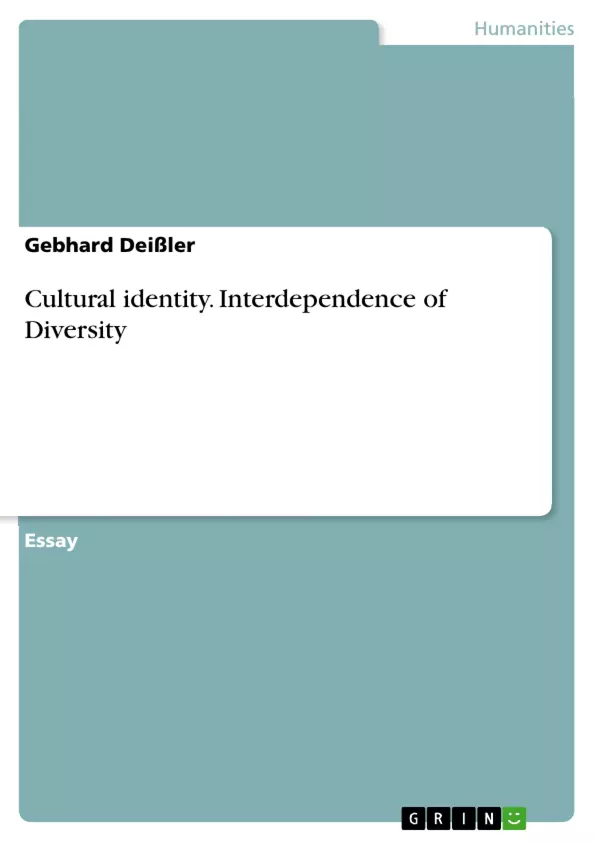There has always been a royal path towards the integrity of social players, of the relationships among them and of society at large. It can be identified, formulated and its processes clarified so as to bring about all-encompassing human integrity.
Inhaltsverzeichnis (Table of Contents)
- THE ONLY WAY
- Intercultural & Transcultural Management
- Interdependence and its Implications
- From Win-Lose to Win-Win
- Transcultural Management - An Overview
Zielsetzung und Themenschwerpunkte (Objectives and Key Themes)
This text aims to explore the concept of transcultural management, examining the interconnectedness of diverse cultures in a globalized world. It emphasizes the need for a new understanding of alterity that is inclusive rather than exclusive, recognizing the interdependence of all cultures within the human social organism.
- Interdependence and its impact on cultural understanding
- The importance of acknowledging one's own cultural identity in relation to others
- The dangers of a win-lose mentality in a globalized world
- The role of transcultural management in fostering cooperation and integration
- The application of systems analysis to understanding complex socio-cultural dynamics
Zusammenfassung der Kapitel (Chapter Summaries)
The first chapter, "THE ONLY WAY", introduces the fundamental concept of interdependence and its crucial role in shaping cultural identity and understanding. It argues that acknowledging and respecting the cultural "other" is essential for building a unified and peaceful global society. The chapter highlights the dangers of rejecting or repressing one's own cultural identity and its negative consequences for the entire human organism.
The second chapter, "Intercultural & Transcultural Management", delves into the complexities of managing intercultural and transcultural interactions in a globalized world. It emphasizes the need for a new approach to alterity, one that embraces inclusivity and acknowledges the interconnectedness of diverse cultures.
The third chapter, "Interdependence and its Implications", explores the intricate relationship between interdependence and cultural understanding. It examines how individual and social self-interest can distort perceptions of interdependence, leading to a win-lose mentality that ultimately harms all parties involved. The chapter uses the metaphor of a social organism to illustrate the importance of healthy and balanced interactions between cultures.
The fourth chapter, "From Win-Lose to Win-Win", examines the transition from a win-lose to a win-win mentality in transcultural management. It emphasizes the benefits of cooperative and collaborative approaches in fostering sustainable and equitable outcomes for all stakeholders. The chapter highlights the need for ethical and responsible leadership in promoting positive intercultural dialogue and understanding.
The fifth chapter, "Transcultural Management - An Overview", provides a comprehensive overview of the principles and practices of transcultural management. It discusses various theoretical frameworks and practical tools for navigating intercultural and transcultural challenges, emphasizing the importance of cultural sensitivity, empathy, and a deep understanding of different cultural perspectives.
Schlüsselwörter (Keywords)
This text explores key concepts such as transcultural management, interdependence, alterity, inclusivity, win-win mentality, systems analysis, cultural sensitivity, and globalized world. It aims to provide a deeper understanding of the role of transcultural management in fostering intercultural understanding and collaboration in a complex and diverse world.
Frequently Asked Questions
What is "transcultural management"?
Transcultural management is an approach that recognizes the interdependence of all cultures and aims to foster inclusive cooperation and integration in a globalized world.
Why is interdependence important for cultural identity?
Acknowledging that cultures are interconnected helps prevent isolationism and promotes a healthy "social organism" where diversity is seen as a collective strength.
What is the difference between win-lose and win-win mentalities?
A win-lose mentality views cultural interaction as a competition, while a win-win approach seeks collaborative solutions that benefit all cultural stakeholders.
What is "alterity" in this context?
Alterity refers to the state of being "other." Transcultural management advocates for an inclusive understanding of the "other" rather than an exclusionary one.
How does systems analysis apply to culture?
Systems analysis helps in understanding the complex socio-cultural dynamics and feedback loops that occur when different cultures interact within a global society.
- Citar trabajo
- D.E.A./UNIV. PARIS I Gebhard Deißler (Autor), 2013, Cultural identity. Interdependence of Diversity, Múnich, GRIN Verlag, https://www.grin.com/document/214557



